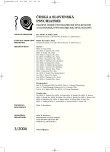-
Medical journals
- Career
Family Correlates of Depression
Authors: F. D. Krch 1,2; L. Csémy 2
Authors‘ workplace: Psychiatrická klinika 1. LF UK a VFN, Praha ; přednosta prof. MUDr. J. Raboch, DrSc. Psychiatrické centrum Praha 1; přednosta prof. MUDr. C. Höschl, DrSc. 2
Published in: Čes. a slov. Psychiat., 102, 2006, No. 3, pp. 130-136.
Category: Original Article
Overview
The authors refer to the results of a questionnaire screening among 3,172 students of randomly chosen secondary and vocational schools in the Czech Republic (response rate 94.7; average age 15.9 years). 21 per cent of the adolescents questioned stated that in the past week they had rather significant symptoms of depression. The number of depressive girls was 2.6 times higher than the number of depressive boys. 45.3 per cent of the adolescents stated that they contemplated suicide sometime during their lives. 8.8 per cent of girls and 4.4 per cent of boys stated attempted suicide.
The respondents perceived conflicts and tension in the family in which they were growing up, as the single most significant stressing family factor. The depressive girls and boys stated that their families were not in order and that there was no atmosphere of trust and understanding. With increasing symptoms of depression especially in the girls, there was a decrease in family cohesion. In the boys no statistically important correlation between a complete family and occurrence of depressive symptoms was found. Girls growing up without siblings stated more depressive symptoms. No significant relation between the occurrence of depressive symptoms and the presence (or absence) of grandparents in the family was found, or between the depression of adolescents and the level of education of their parents. The study confirmed relation between assessment of the material status of the family and the occurrence of depressive symptoms.
The results of the study suggest that life in an incomplete family does not always have to be a stressing factor and that vulnerability towards depression is significantly increasing especially in relation to immediate problems in the basic family of the adolescent and to the atmosphere in the family. The study confirmed significant gender differences both in perception and assessment of one’s own experiences and the family context. The girls were responding in a different and more sensitive way to environmental stimuli and to social context.Key words:
depressive symptoms, adolescence, family, gender
Labels
Addictology Paediatric psychiatry Psychiatry
Article was published inCzech and Slovak Psychiatry

2006 Issue 3
Most read in this issue- Sexual Orientation and Homosexual Experiences in Female Schizophrenic Patients
- Hypodynamic Syndrome in Abstinent Alcoholics
- Family Correlates of Depression
- Clinical Aspects of Suicidality
Login#ADS_BOTTOM_SCRIPTS#Forgotten passwordEnter the email address that you registered with. We will send you instructions on how to set a new password.
- Career

